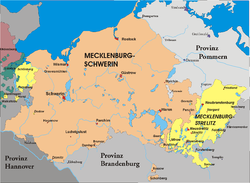Duchy of Mecklenburg-Strelitz
| Duchy of Mecklenburg-Strelitz | ||||||||||
| Herzogtum Mecklenburg-Strelitz | ||||||||||
| State of the Holy Roman Empire (until 1806) | ||||||||||
|
||||||||||
|
||||||||||
|
Mecklenburg-Strelitz
|
||||||||||
| Capital | Strelitz then Neustrelitz | |||||||||
| Government | Feudal monarchy | |||||||||
| Duke of Mecklenburg-Strelitz | ||||||||||
| • | 1701–1708 | Adolphus Frederick II | ||||||||
| • | 1708–1752 | Adolphus Frederick III | ||||||||
| • | 1752–1794 | Adolphus Frederick IV | ||||||||
| • | 1794–1815 | Charles II | ||||||||
| History | ||||||||||
| • | Treaty of Hamburg | 1701 | ||||||||
| • | Raised to Grand Duchy | 1815 | ||||||||
|
||||||||||
| Today part of |
|
|||||||||
The Duchy of Mecklenburg-Strelitz was a duchy in northern Germany, consisting of the eastern fifth of the historic Mecklenburg region, roughly corresponding with the present-day Mecklenburg-Strelitz district (the former Lordship of Stargard), and the western of the former bishopric of Ratzeburg in modern Schleswig-Holstein. At the time of its establishment, the duchy bordered on the territory of Swedish Pomerania in the north and of Brandenburg in the south.
After more than five years of dispute over succession to the House of Mecklenburg, the duchy was established in 1701 in the territory of the former duchy of Mecklenburg-Güstrow. The Güstrow branch of the House of Mecklenburg had died out with the death of Duke Gustav Adolph in 1695. Duke Frederick William of Mecklenburg-Schwerin claimed heirship, but he had to deal with the demands of his uncle Adolphus Frederick, husband of Mary of Mecklenburg-Güstrow, the daughter of Gustav Adolph. The emissaries of the Lower Saxon Circle finally negotiated a compromise on March 8, 1701. The agreement created the final, definitive division of Mecklenburg and was sealed with the 1701 Treaty of Hamburg. Section 2 of the treaty established Mecklenburg-Strelitz as a duchy in its own right and assigned it to Adolphus Frederick, together with the Principality of Ratzeburg on the western border of Mecklenburg south of Lübeck, the Herrschaft Stargard in the southeast of Mecklenburg, with the cities of Neubrandenburg, Friedland, Woldegk, Strelitz, Burg Stargard, Fürstenberg/Havel and Wesenberg, and the commandries of Mirow and Nemerow. At the same time the principle of primogeniture was reasserted, and the right to summon the joint Landtag was reserved to the Duke of Mecklenburg-Schwerin. The 1701 provisions were maintained with minor changes until the end of the monarchy. Both parties continued to call themselves Dukes of Mecklenburg; Adolphus Frederick took his residence at Strelitz.
...
Wikipedia



